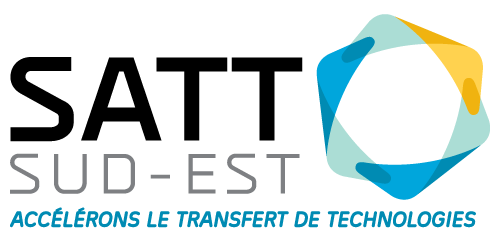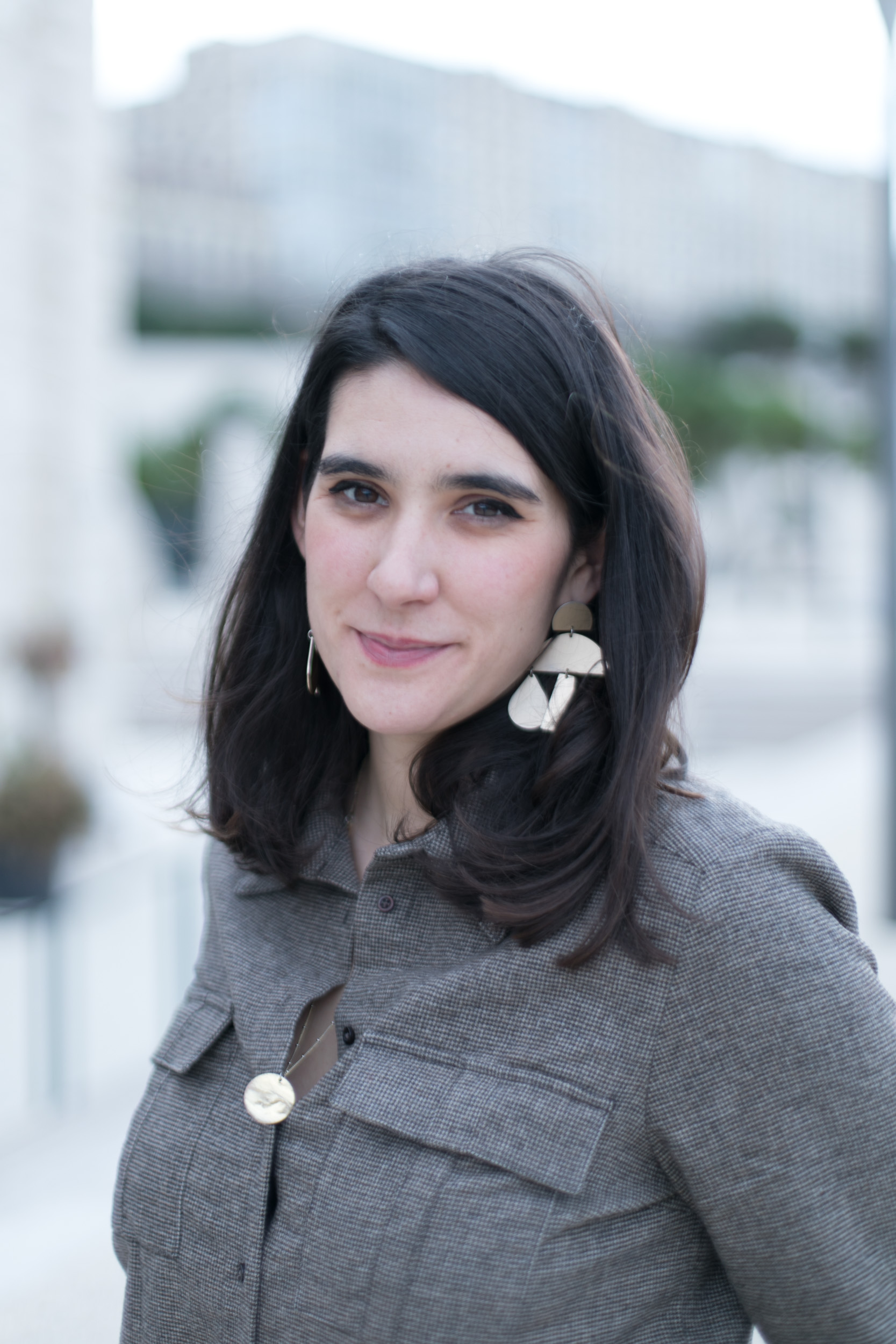La SATT Sud-Est est fière d’avoir accompagné les équipes lauréates et coup de coeur de ce marathon créatif dématérialisé « de l’idée au projet » qui permet aux étudiants de revêtir le costume de startupers
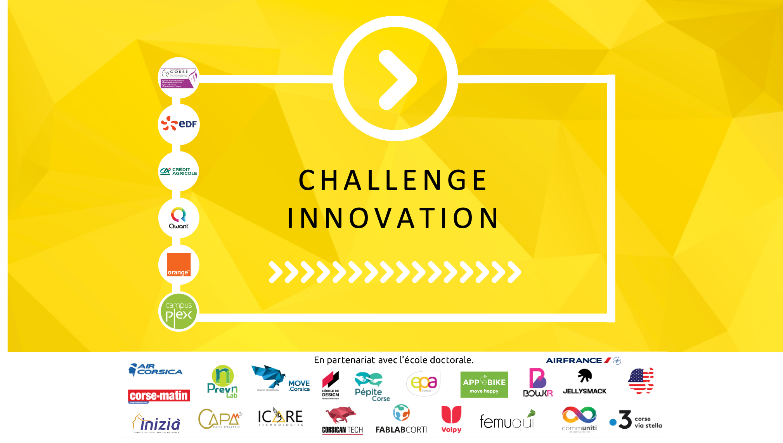
« Le Challenge Innovation est un marathon créatif dans lequel on demande aux étudiants de développer une idée, jusqu’à un prototype de start-up, en 2 jours et demi. Cette année, 51 étudiants, toutes filières confondues ont participé dans ces conditions inédites, in casa. L’ensemble de nos partenaires – en plus de financer l’évènement -, met à disposition des compétences pour accompagner nos jeunes. Les étudiants se retrouvent dans la peau de startuppers qui présentent leurs projets de création d’entreprises devant des investisseurs à convaincre. Au-delà de l’objet pédagogique, on voit émerger de véritables projets de start-up et environ un tiers des projets sont ensuite développés, avec le statut d’étudiants-entrepreneurs, au sein du pôle Pepite Corse. Pour certains, ce sont les premiers jalons d’un projet professionnel viable. »
Graziella LUISI, Directrice de la Fundazione Università di Corsica
« J’ai été surpris par la grande maturité des projets dont certains étaient quasiment au stade de la production, et j’en profite pour renouveler ici mes félicitations à tous les participants. Cette philosophie d’innovation participative sur un temps de préparation et de réflexion relativement court est selon moi très formateur pour nos étudiants. Le challenge est un véritable levier de motivation et de mobilisation des équipes, constituées autour de l’innovation. Il a permis de générer une dynamique de brassage des idées et des étudiants de différentes filières de l’UCPP. Ce processus d’innovation était soumis en permanence aux regards des différents coaches qui ont montré une implication sans faille pendant toute la durée du Challenge. Cette année avec la thématique COVID, le challenge de l’innovation a permis de bousculer des codes de réflexion notamment aux regards de cette situation sanitaire inédite ; les étudiants ont proposé des solutions véritablement innovantes. Ce challenge contribue à diffuser la culture de l’innovation et du travail collaboratif. »
Dominique CANCELLIERI, Chargé de mission Innovation Scientifique Università di Corsica
Margot, peux-tu nous présenter le Challenge Innovation ?
Le Challenge Innovation est un concours d’idées dédié à l’innovation numérique organisée par la Fondation de l’Université de Corse. Durant 3 jours, du 10 au 12 juin, les étudiants ont travaillé en équipes autour de projets innovants dans le domaine du numérique. Cette édition inédite baptisée « In Casa », s’adressait à tous les étudiants qui souhaitent répondre aux défis engendrés par la crise du virus COVID-19 et proposer une idée pour apporter une solution innovante au territoire. Les étudiants ont été accompagnés dans la construction de leurs projets par des experts, des coaches et des mentors.
Quel rôle as-tu joué lors de cet événement ?
En tant que partenaire de l’évènement, pour la SATT Sud-Est, j’ai coaché deux équipes avec l’aide de deux autres experts dans le domaine de l’innovation, Stéphanie VANHOVE-MILON, chargée d’affaires à l’incubateur Inizià, et Marc LABBE, responsable pédagogique de la Licence professionnelle Métiers du design à l’IUT de Corse. Notre fil conducteur était de guider les étudiants dans le développement de leur projet d’entreprise tant sur le plan business, technique et surtout, de les préparer au pitch final, crucial pour remporter ce concours ! Pendant 3 jours, j’ai suivi les étudiants pas à pas, en tenant des points d’avancement réguliers pour répondre à leurs interrogations, les orienter vers la bonne voie et les encourager. Ils ont démontré une motivation sans faille et le travail réalisé en trois jours est considérable. C’est une fierté de voir des projets aussi aboutis en si peu de temps !
Quelles étaient les équipes « In Casa » que tu as coachées ?
La première équipe, « Scatula » composée d’Andrea ZARK, Sarah SIMIAN, Axelle CIANFARANI et Pauline MARBIA qui clôturent toutes les quatre leur DUT Génie Biologique propose de commercialiser une boîte de désinfection de masque en tissus. Cette équipe a été nommée lauréate du concours.
La seconde équipe, « Frazu d’oru » était constituée de Jelena MARJANOVIC, doctorante en première année de thèse en économie circulaire au sein de l’UMR CNRS 6240 LISA, Ambre BOUHAIGOUR, en troisième année de Licence d’Art Appliqué et d’Elliot BEAULIEU, en troisième année de Licence Professionnelle Design Numérique et graphiste au Fab Lab. Elle propose une application mettant en réseau une communauté pour la valorisation des biodéchets en compost en Corse ; l’équipe s’est vue décerner le prix « coup de cœur »
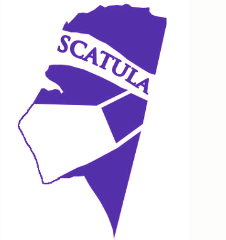
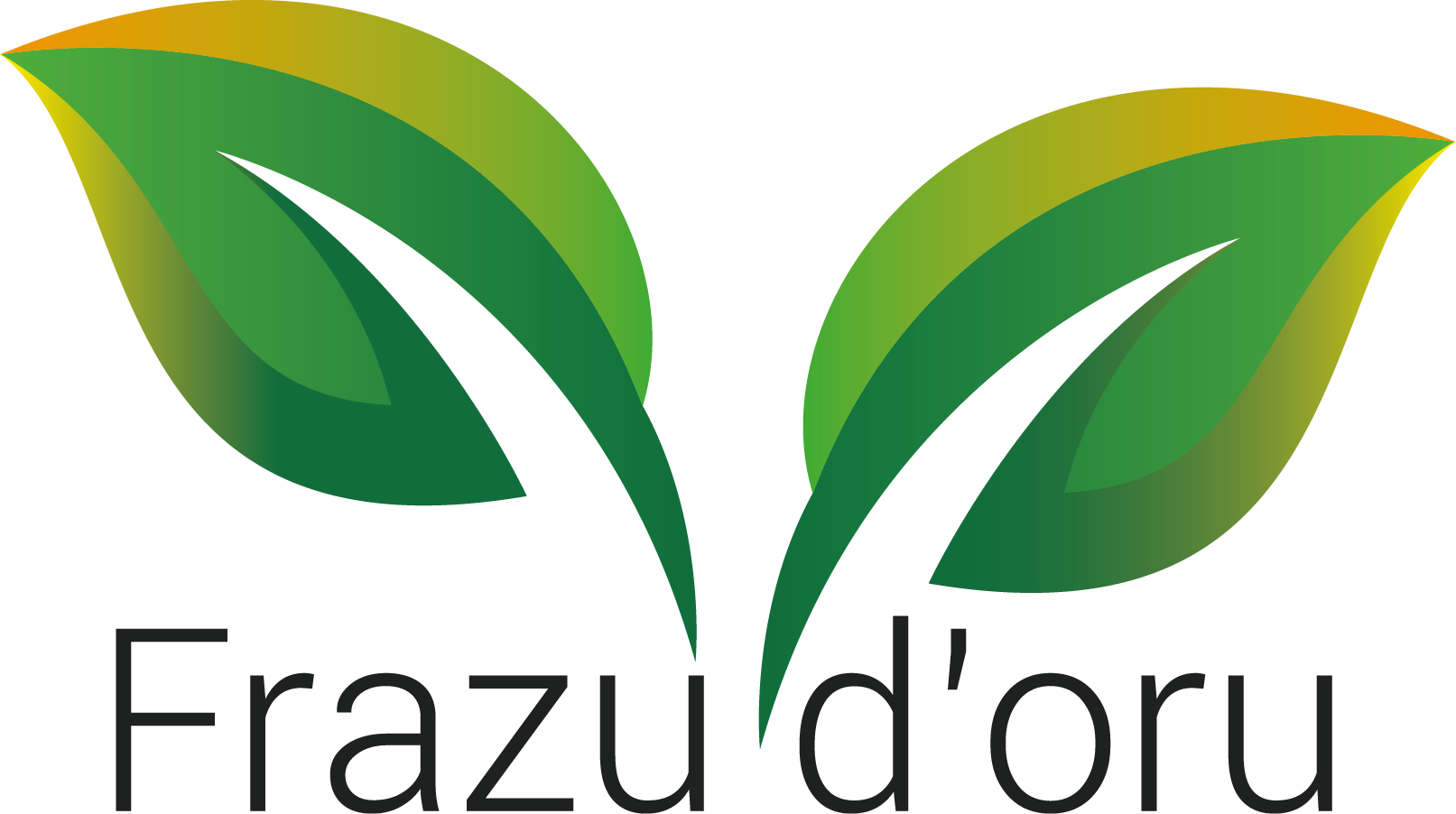
Interview de l’équipe gagnante, composée Andréa ZARK, Sarah SIMIAN, Axelle CIANFARANI et Pauline MARBIA, étudiantes à l’IUT de Corte et diplômées d’un DUT en Génie Biologique spécialisé en Industries Agroalimentaires et Biologiques. Elles ont proposé un concept d’étui permettant d’assainir un masque en tissus dans un délai de cinq minutes, par les UV

Quelles sont les raisons qui vous ont poussées à participer à ce marathon créatif ?
Pauline MARBIA et Sarah SIMIAN nous expliquent : « une fois nos examens terminés, l’un de nos professeurs nous a contactées pour nous présenter le Challenge Innovation « In Casa ». C’est ainsi que nous avons découvert ce concours et son thème : « Innover et répondre aux défis du Covid-19 ». Très intéressées par le fait de pouvoir mettre à profit les connaissances acquises durant notre DUT au sujet des déchets, leurs traitements mais surtout leurs impacts, nous avons décidé de nous inscrire à ce challenge. Mais ce qui nous a le plus attiré, c’est la possibilité de proposer une solution concrète à une problématique environnementale liée à la crise du virus Covid-19. Notre cursus nous sensibilise au respect de l’environnement qui, à notre sens, devrait être une priorité. Ainsi, ce challenge nous permettait, pour une fois, de réellement « agir », ou du moins d’essayer, au lieu de se contenter de parler sans cesse de ce qui devrait être fait. »
Axelle CIANFARANI précise : « nous avons remarqué que, depuis le début du déconfinement, de nombreuses personnes jettent leurs masques de protection dans la rue, à même le sol dans les parkings, dans les caniveaux, etc. Ces déchets se retrouvent ensuite dans la mer Méditerranée puisqu’ils sont drainés par les eaux de pluie et passent dans le réseau d’eau pluvial. Or, les masques jetables utilisés pour se protéger contre le Coronavirus ne sont ni biodégradables ni recyclables puisqu’ils sont faits de polypropylène. Ils mettraient plus de 400 ans à se dégrader. Ces masques jetés par terre sont potentiellement infectés et constituent alors un danger pour tous. En effet, le Coronavirus peut vivre plusieurs jours sur le masque (pendant au moins sept jours sur la surface extérieure et jusqu’à quatre jours sur la surface intérieure). Nous souhaitions trouver une idée qui permettrait de répondre à ces deux problématiques grâce à nos connaissances. Nous avons alors pensé à privilégier l’utilisation des masques en tissu mais la procédure de nettoyage de ce type de masque est longue et très protocolaire. De plus, le nombre de lavage en machine est prédéfini. C’est à ce moment que nous est venu l’idée d’utiliser l’UV pour éliminer le virus.
Andrea ZARK, poussée par les mêmes motivation que ses collaboratrices ajoute : « je me suis dit que ça pouvait être une bonne expérience et enrichissante. » tandis que Pauline MARBIA souligne « au-delà de cet aspect d’engagement pour l’environnement, le fait de faire de nouvelles connaissances, comme ce fut le cas, et d’être mise en situation de stress et de dépassement de soi-même avec ces trois jours intensifs ont également influencé ma décision quant à ma participation à ce challenge. Ce fut une très belle expérience. »
Qu’est-ce que ce concours d’innovation vous a apporté ?
Pour Pauline MARBIA : « ce concours m’a appris l’importance de s’intéresser à tous les éléments qui accompagnent la création d’un objet comme le nôtre. En effet, notre formation en génie biologique nous a certes permis de fabriquer des produits alimentaires, mais nous nous intéressions préférentiellement aux techniques et processus de fabrication et non au marketing, business plan ou encore au modèle économique et méthodes de commercialisation. C’est donc un nouvel aspect que j’ai perçu grâce à ce concours. Je dois avouer que le premier jour fut assez compliqué étant donné que ces notions nous étaient quasiment inconnues. Ce concours nous a donc appris à rapidement nous adapter et nous initier à de nouvelles notions. Nous avons très vite géré notre stress et mis de côté nos doutes pour nous concentrer sur nos lacunes et nous adapter le plus rapidement possible et de notre mieux à la situation. Axelle CIANFARANI poursuit : « pour moi, ce challenge a été une très bonne expérience qui m’a permis de comprendre comment monter un projet en prenant en compte tous ses aspects, et comment développer une idée. Effectivement, comme le dit Pauline, les termes comme « plan de financement », « stratégie de développement » ou « modèle économique » nous étaient complètement inconnus, par exemple. Maintenant, nous savons qu’il faut étudier le marché visé et la stratégie commerciale à adopter pour proposer un projet viable. De plus, il est primordial de réfléchir aux moyens humains, techniques et financiers nécessaires à la maturation du projet. »
Toutes les quatre s’accordent sur l’intensité et la richesse de l’expérience de ce travail en équipe, comme l’explique Andrea ZARK, « ce challenge m’a permis d’améliorer mes capacités de travail tant en équipe que seule. Ce concours de trois jours nous plonge vraiment dans le monde du travail avec des tâches à réaliser en un temps précis avec des défis qui viennent s’ajouter au travail pour nous déstabiliser et nous déconcentrer. Le fait d’avoir été réalisé à distance m’a demandé plus de concentration car le cadre n’est pas optimal et être loin de ses camarades de travail peut être parfois déconcertant. Ainsi, je pense que ce challenge permet de ses rendre compte de ses capacités de travail car nous sommes en immersion totale dans le projet et nous n’avons pas le temps de penser à autre chose. Je trouve que cela permet de vraiment canaliser sa concentration sur un sujet et que les risques de dispersions sont minimums. Je pense que c’est vraiment une expérience à vivre car même si elle est intense et quelque peu stressante elle nous permet, aux jeunes, d’avoir un aperçu réel du monde du travail. »
Sarah SIMIAN salue l’accompagnement par les coaches qui leur ont appris à « vendre » un produit. « En effet, il était indispensable de présenter la SCATULA de façon à mettre en avant son intérêt, ses cibles ou encore les nombreux avantages qu’elle présentait face à la concurrence » termine Pauline MARBIA.
Interview de l’équipe Coup de Coeur

Frazu d’oru est porté par qui ?
Ce projet est né de la collaboration entre trois étudiants de l’Université de Corse Pasquale Paoli. L’équipe est animée par Jelena MARJANOVIC – actuellement étudiante en première année de thèse en économie circulaire – Elliot BEAULIEU – alternant en Licence pro Design Numérique en tant que graphiste au Fab Lab et à la Fondation de l’université de Corse – et Ambre BOUHAIGOUR – étudiante en en troisième année de licence d’art appliqué.
Quel est votre projet ?
Au sein d’une communauté, nous mettons en réseau à l’aide d’une application, les établissements qui créent des déchets alimentaires avec les agriculteurs qui les transforment en compost.
Comptez-vous poursuivre l’aventure Frazu d’oru ou, plus largement, vous lancer dans l’entrepreneuriat ?
Nous pensons réellement que ce projet est très pertinent pour répondre rapidement aux problématiques des crises sanitaires et environnementales liées ici à une crise des déchets qui impacte la Corse depuis des années. Etant actuellement tous dans la poursuite de nos études, nous ne savons pas si nous aurons le temps de consacrer assez de temps à la réalisation de ce projet mais une fois diplômés nous aimerions continuer le projet Frazu D’oru, pour le mener à bien grâce à nos compétences très complémentaires. Pour le moment nous aimerions continuer à participer à des concours comme le challenge innovation pour développer et donner une visibilité à ce projet jusqu’à la fin de nos études.
Pour aller plus loin
- Consultez le site du Challenge Innovation
- Consultez le site de la Fundazione Università di Corsica
- Consultez le site de l’Université de Corse Pasquale Paoli
@SATTse_ @UnivFundazione @UnivCorse #challengeinnovationincasa
